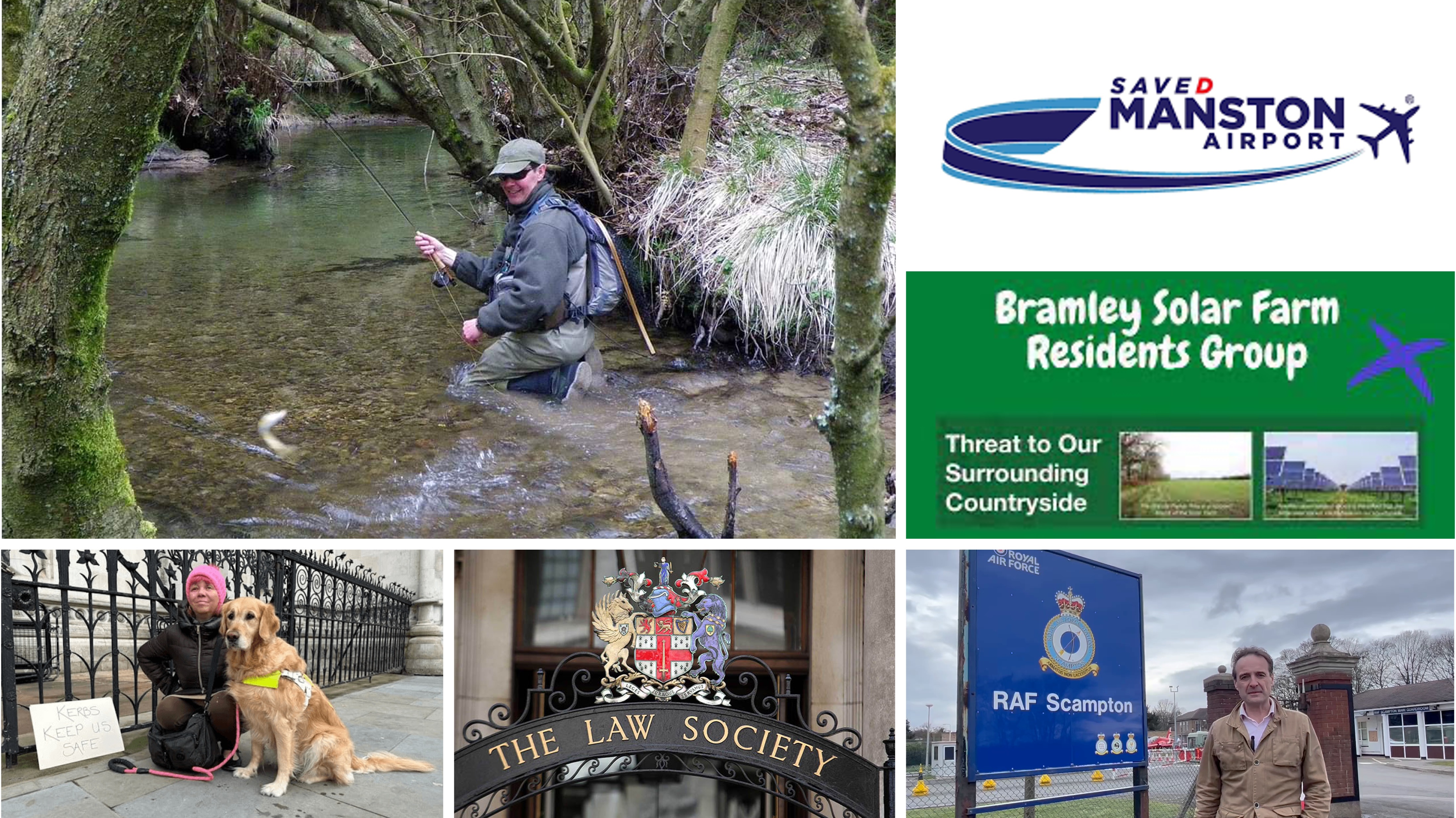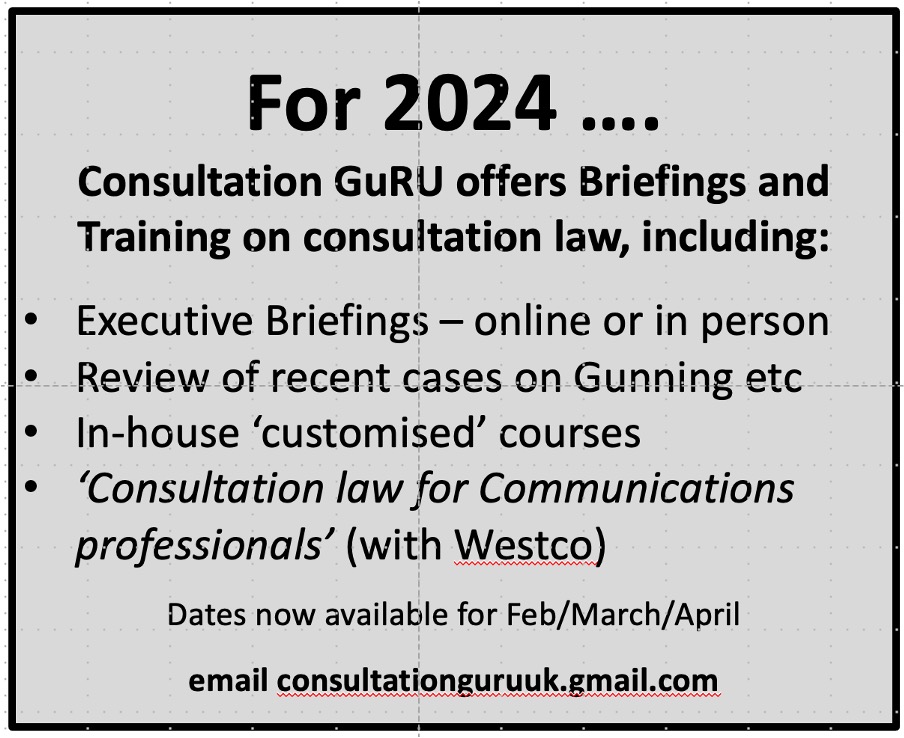This is Blog no 53
Like a fleet of the proverbial ‘London buses’, the closing weeks of 2023 have seen a continuous procession of High Court judgments on judicial reviews where aspects of public consultation have been determined.

The most significant is likely to be Pickering Fishery Association v DEFRA. This is a case that has attracted huge public interest as it is seen as a victory for campaigners against water companies discharging sewage into our rivers. The fishery in question is on Upper Costa Beck (“UCB), claimed to be “one of the best trout and grayling rivers in Yorkshire”.
The Association claimed that the Government was misinterpreting its own post-BREXIT laws to protect the environment by consulting the public on an insufficiently detailed account of what actions it would take to address the deterioration in water quality. Through the 2017 Water Framework Directive the Environment Agency was required to prepare a management plan and in this case, the question was whether the Humber River Basin management plan could be lawfully signed off, having only proposed ‘generic’ measures for the whole area, and not on a river-by-river basis.
The Court ruled that the environmental objectives were ‘water-body’ specific and in the absence of such granularity in the consultation, it obviously failed the Gunning principle. To that extent, the consultation issue is an open-and-shut matter. If the Government chose not to produce a management plan adequate for the required consultation, then the fundamental failure was not one of consultation practice, but of poor policy-making. Most embarrassing for DEFRA was Mrs Justice Lieven’s observation that “there is a considerable element of smoke and mirrors here.” A warning shot across the bows of Ministers presiding over environmental deterioration.
Similar themes are featuring in many judicial reviews lately.
In October, a decision to approve the re-opening of Manston Airport in Kent as a dedicated air freight facility went to the High Court. In Dawes v Transport Secretary & Riveroak, campaigners questioned the Minister’s decision to approve a DCO (Development Consent Order) despite an Examining Authority recommending against it. The case is mostly about climate change and whether there was a case for additional air freight capacity. The proposal had been modified and there had been a process to engage with stakeholders called re-determination. This was not wholly satisfactory but was not sufficiently flawed (per J. Sullivan’s oft-quoted definition of being ‘clearly and radically wrong’) as to warrant declaring the consultation unlawful.
In the meantime, we have had what I believe is the first consultation-based legal challenge to the siting of a controversial solar farm. In Bramley Solar Farms Residents Group v the Levelling-up Secretary and Bramley Solar Ltd, campaigners pointed to several problems in a second consultation undertaken by the developer after its initial proposal was modified. The Judge found against the residents because such mistakes as were made, as over the deadlines for responses, did not materially prejudice the interests of the public. I somehow doubt if local people saw it quite that way.
As in planning, much of the real controversy in consultation cases lies in the information being published. In a highly technical judgment affecting the amount of evidence that parties to a judicial review should share, the Government was obliged to disclose information it had previously withheld. In R (Law Society) v The Lord Chancellor & Justice Secretary, what was in question was whether the Law Society should have access to local consultation data as to the effectiveness of access to justice in our hard-pressed Courts system. Mr Justice Fordham decisively gave them everything they asked for – demonstrating yet again that the Courts may often go the extra mile to assist claimants who argue that public policy decisions and their related consultations are unfair.
Another theme that is proving persistently litigious is the vexed question of asylum seekers and how to house them. This Autumn, local Councils sought to prevent the Government from using sites at RAF Wethersfield and RAF Scampton to accommodate asylum seekers. The specific point at issue concerned fulfilling the due regard provision of the Equality Act in respect of the Public Sector Equality duty. In Braintree and West Lindsey DCs v Home Secretary & Defence Secretary, it emerged that Ministers had decided not to undertake formal engagement with local communities before announcing the potential use of the sites. The question was whether this made the Equality Impact Assessment (EIA) so flawed as to make the decision unlawful. There was evidence of a significant risk of community tension, but Mrs Justice Thornton accepted that the Home Office was adequately informed of the circumstances and there was no need for a specific consultation to inform the EIA.
Finally, we have the Court of Appeal’s ruling on an important judicial review affecting people who are visually impaired. It concerns Guidance on minimum kerb heights that affect such people’s ability to move about in the ‘built environment' and is known as the Use of Tactile Paving Surfaces and Inclusive Mobility. Earlier this year, the disability campaigner, Sarah Leadbetter successfully challenged the Secretary of State for Transport that the consultation leading up to revised Guidance in 2022 failed to meet the Gunning Principles. It had consisted of an online survey open only for 12 days (No braille format document was available) and, much later, attendance at a stakeholder workshop at which it was admitted that few if any changes would be made before the Guidance was finalised. This is the Leadbetter v Transport Secretary case last February and – on the consultation aspect specifically, the Court found in her favour. It did not, however, quash the Guidance.
Last week, the Court of Appeal re-visited the matter, and but again refused to quash the Guidance. It did however confirm that the Government was refused leave to appeal against the finding that the consultation was unlawful. This conclusion will bring some reassurance to disability campaigners, who often feel they can be fobbed off with consultation exercises that do not ensure their participation on an equal basis. Also, they appear to have successfully persuaded Ministers to look again at the Guidance.
IN SUMMARY

The recent cases ( and there are others …) illustrate the unpredictable attitude of the Courts to cases when there are failures in public consultation. So much depends upon the wider public policy context. Recent cases affecting immigration and environmental standards demonstrate that the most pressing political issues have a way of emerging as key stimuli for public engagement and consultation.
And where these go wrong, public trust can so easily be eroded.
If you consult, do it well ....
Rhion H Jones LL.B
Commentaries are prepared primarily to help consultation practitioners take account of developments in the law and to guide them on situations where legal advice should be sought. They are no substitute for reading Court judgments or studying statutory provisions or associated Guidance.
Rhion has monitored and written commentaries on the Law of Consultation since 2007 but does not provide legal advice. He will, however, be happy to discuss the content of this or any other commentary.
See Rhion's Speeches etc - click here
For More like this - free of charge: now click here
Leave a Comment
I hope you enjoyed this post. If you would like to, please leave a comment below.